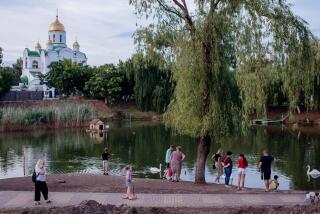Siberia Longs for a Connection Across the Pacific : Soviet Union: Vladivostok and its region smolder over their isolation from Moscow. We should build a bridge of sorts.
- Share via
America’s nearest overseas neighbor is the Soviet Union. Yet our view of that country is Eurocentric; we tend to look at it the long way, eastward across the Atlantic instead of westward across the Pacific. Many people in Vladivostok, the leading city of Pacific Siberia, are urging us to look across the Pacific. Don’t ignore the regions closest to you, they say.
At a time of global trend from nationalism and centralization to regionalism and local authority, the geography of proximity takes on new importance. Yet Vladivostok, headquarters of the Soviet Pacific fleet, has remained remote to Americans and even Soviet citizens because of poorly developed transportation networks and government security policy.
A visit to this long-sealed fortress city, capital of the Primorie (Maritime Province) reveals a smoldering rage against the Moscow bureaucracy and a warm desire for economic independence for the region. Some are even talking of political autonomy. In the Primorie’s case, yearnings for greater independence do not stem from ethnic differences with Moscow (Slavs heavily predominate in the Soviet Far East) but erupt instead from a sense of administrative abuse. “They treat us like a colony!” is the cry. Local people find the central authorities condescending in their attitudes and incompetent at dealing with local problems. Why for instance, Vladivostok asks, is Leningrad dictating the study of Pacific oceanography? What do they know about the Pacific?
No matter who is to blame, the local economy is certainly in a bad way, suffering from its narrow base of timber, fish and extractive industries. The region must import 50% of its food. Existence is characterized by scarcity, dilapidation and alarming environmental degradation.
“You cannot believe how bad our life is,” one woman scientist remarks. “We talk of nothing but the struggle to find essential material things: food, clothing, a flat.” No wonder turnover is high; many workers and intellectuals who come to the Far East soon leave in disgust. Yet the foreign visitor is impressed by the courage and intellect of the people, their savage self-mocking humor and ruthless candor. “We are survivors,” they say proudly.
Civilians do not conceal their resentment toward the military. “They have made of our Primorie a wasteland surrounded by a hedge of missiles,” one scholar remarks. Some people talk of the desirability of getting the Navy out and wistfully refer to Singapore as a possible paradigm, a great naval base turned into a center for the manufacture of high-tech consumer goods. But the iron grip of the military keeps the “open” status of Vladivostok ambiguous, even four years after Mikhail Gorbachev’s speech there promising it.
In the city’s intellectual community, there is thirst for change, a longing for international interactions in commerce and culture. The phrase “joint venture” hangs on everyone’s lips. The citizens of Vladivostok respect the Japanese. Old Toyotas and Mazdas find appreciative new owners here. South Korea is attracting new admiration. But everyone wants to practice English and visit the United States.
World peace depends on a stable Soviet Union. It is to no one’s interest to have that huge nation fall into economic collapse and political chaos. What can and should the United States do? Massive investment in the Soviet Union or even just in the Primorie is unfeasible. Even if we were to find and commit the money, the scale and complexity of the problems is too great, and not to be solved by anyone except the Soviet people themselves.
What many people of the Primorie would like is the chance to study in the United States in order to develop a stronger sense of the entrepreneurial culture they perceive necessary to the success of a market economy. We should offer them this opportunity. American troops occupied Vladivostok for a year and a half at the beginning of the Bolshevik Revolution, their presence interpreted by the Soviets as imperialist aggression. We now have the opportunity to erase that image. A program bringing 100 scholars a year from the Primorie for the next five years would cost relatively little. Yet in a population of only 2 million, it would create a critical mass for change and yield great return, both to local benefit and that of U.S.-Soviet relations.
More to Read
Sign up for Essential California
The most important California stories and recommendations in your inbox every morning.
You may occasionally receive promotional content from the Los Angeles Times.













